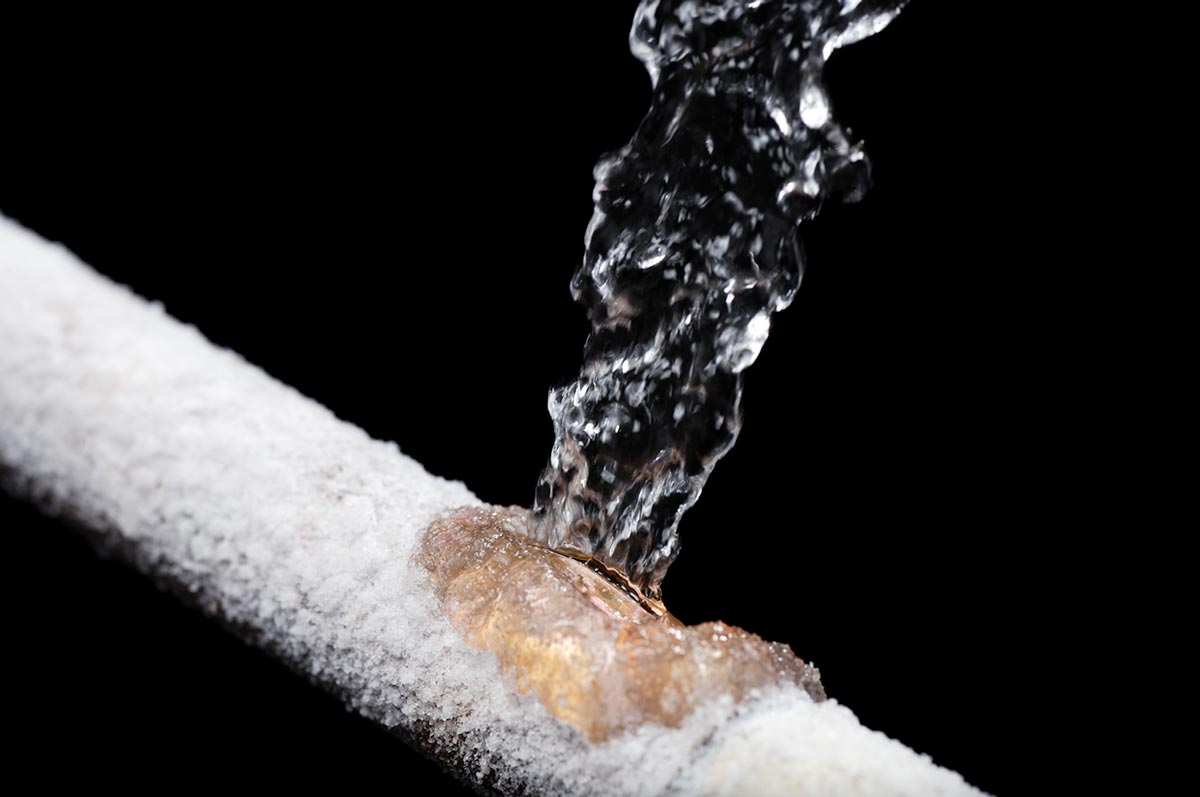With cold and freezing weather approaching, it’s important to be aware of one of the more damaging results of extreme temperatures: burst pipes. A burst pipe can lead to extensive flooding and structural damage, especially if it occurs above the ground floor. This article outlines some of the causes and signs of burst pipes and provides some steps for prevention.
Causes
Pipes can burst for a number of reasons including chemical corrosion, physical damage or thermal stress. Galvanized pipes are predisposed to corrosion and rust, and over time, weaken, making them prone to bursting. Clogged or blocked drains can result in additional pressure on pipes and cause them to rupture. Tree roots may also comprise a pipe, or it may burst from stress as the house settles. In the winter, pipes located along the outer walls, in the attic or basement may freeze, and when the water’s crystal structure expands to form ice, the pressure can cause the pipe to burst.
Signs a Pipe Has Burst
Strange noises, such as whistling or bubbling, may indicate that a pipe has been compromised. Unpleasant odors may occur if pipes are not draining properly and can be a sign that the line is broken. Leaks are often noticed when puddles form near or under a broken pipe. While highly visible indicators make it simple to detect a burst pipe, they are less obvious when occurring in the walls and ceilings. Damp drywall or rings on the ceiling are significant indicators that a pipe has ruptured. The pipe should be repaired immediately to prevent further damage. If there is a sudden change in the color of the water, pipes may be beginning to corrode and should be replaced before they break. A substantially higher than normal water bill may also be a sign that a pipe is broken.
Steps for Prevention
To prevent pipes from freezing, ensure they are well insulated or wrap them with heat tape. Use caulk to seal off any areas where cold air may enter such as around electrical wiring or dryer vents. If water pipes are located in outer walls, the attic or basement, leave the water dripping slowly when temperatures drop below freezing. Leaving the hatch for the attic open will also allow warm air to circulate. An annual inspection can help prevent expensive repairs caused by a ruptured pipe. A plumbing professional can assess the condition of your pipes and inform you if they need to be replaced before they burst.
Water Damage Restoration
Water damage from a burst pipe can be catastrophic. In addition to the cost of utilities, damaged household furnishings and ruined electronics, structural damage may result in an enormous expenditure. Water can damage hardwood floors, molding and concrete. If left undetected, it can seep into crevices, beneath molding or the foundation where it may foster the growth of bacteria and mold. Exposure to mold can increase the risk of respiratory illness and other diseases.
If you have a burst pipe, or just notice some of the signs that a pipe is close to bursting, contact a General Contractor. Unlike plumbers or cleaning specialists, Contractors work in not just the removal of water and mold, but ensuring it’s permanent eradication.
At JMC, we are committed to doing things the right way the first time as to not cause additional damages or costs later down the road. We work with homeowners to educate them in common insurance gaps and to ensure that every aspect of the water damage is adequately appraised and covered. We are passionate in our dedication to make the best of a bad situation and make improvements to help maintain or improve a home’s value after a major catastrophe. Call JMC today at 718-763-2977.

